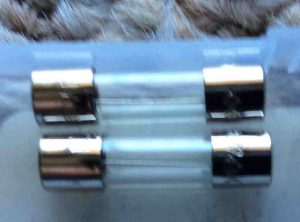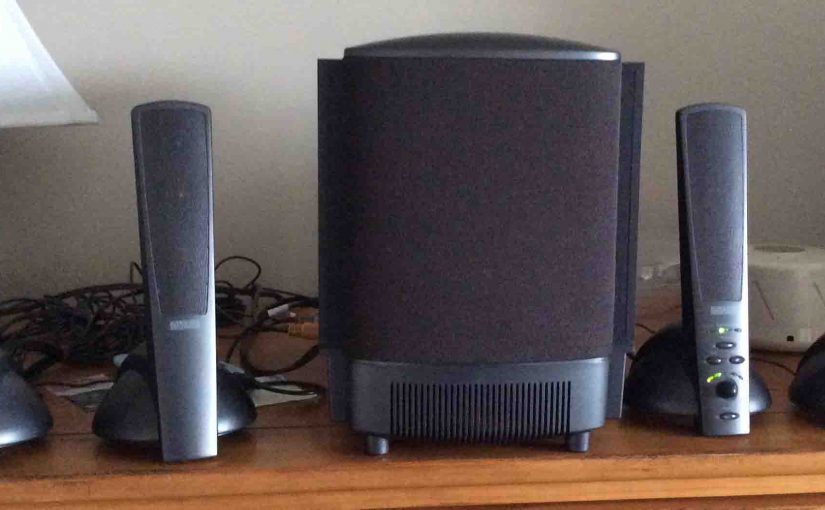Love these amplified speakers. But after a decade, they started blowing their internal 1.6A slow-blow fuse. And, given how sweet these units sound, we couldn’t bear throwing them out. Not without at least taking a stab at fixing the blowing fuse problem in this Altec Lansing ATP5 speaker set.
Fixing Blowing Fuse in ATP5 Altec Lansing Speakers
Thus, during disassembly of the subwoofer (big) unit, we saw the open power line fuse in the bottom tray. We replaced it. Then, the new one blew again, right away.

Tracking Down the Short
So, started reading around the circuits with a volt ohm meter. This revealed a short circuit across one of the main power supply bridge rectifier diodes; a KBU603 four-diode package.
Checked the Power Supply Diodes
Then, to further narrow down where the short was, and to rule out the bridge, we unsoldered the KBU603. But the meter still read a short across the minus terminal and one side of the AC input. Plus, out of circuit, all four diodes in the bridge read good. Nope, not the bridge.
Looked for Burn Marks on Circuit Board to Continue with Fixing Blowing Fuse in ATP5 Altec Lansing Speakers
Then, we inspected the circuit board with a magnifying glass. That showed a blackened “snubber” bypass capacitor. They have four in there, one directly across each diode in the KBU603. We’d show you a picture. But this very small capacitor crumbled apart in our fingers.
Found a Burned Disc Capacitor
Unusual to see a bypass cap in a low-voltage (less than fifty volt) circuit, short out like this. Indeed, this is the first time I’ve ever come across one. So, I was not at first, looking for this type of failure. But the board inspection with the magnifying glass showed this to be the case. Perhaps a power surge or nearby lightning strike caused this burning failure. Fortunately though, these capacitors were easy to spot and access.
Removed this Capacitor
Anyway, with the leads of that charred disc capacitor snipped, the power circuits no longer read a short. Then once we resoldered the diodes and installed a fresh fuse, the speakers played normally. No further fuse blowing. So don’t be afraid to use that multimeter to trace down shorts. Also, carefully look over those circuit boards visually. Doing this inspection can often uncover an obvious problem.
Did Not Replace It
Our research on snubbing bypass capacitors reveals that they reduce diode switching noise. This can be necessary because this noise can occur during normal operation, and might appear in the audio output. So, without the right capacitor in stock, just removed the old capacitors and replaced them with nothing. Yet we hear little increased humming and buzzing in the speaker output. Nor do we hear any loss in sound quality. So, we’ll leave the place for that capacitor blank.
Maybe these Altec Lansing powered speakers will last another fifteen years before requiring further fixing. Now, the final task is to figure out where one extra screw goes that we found on the workbench.
